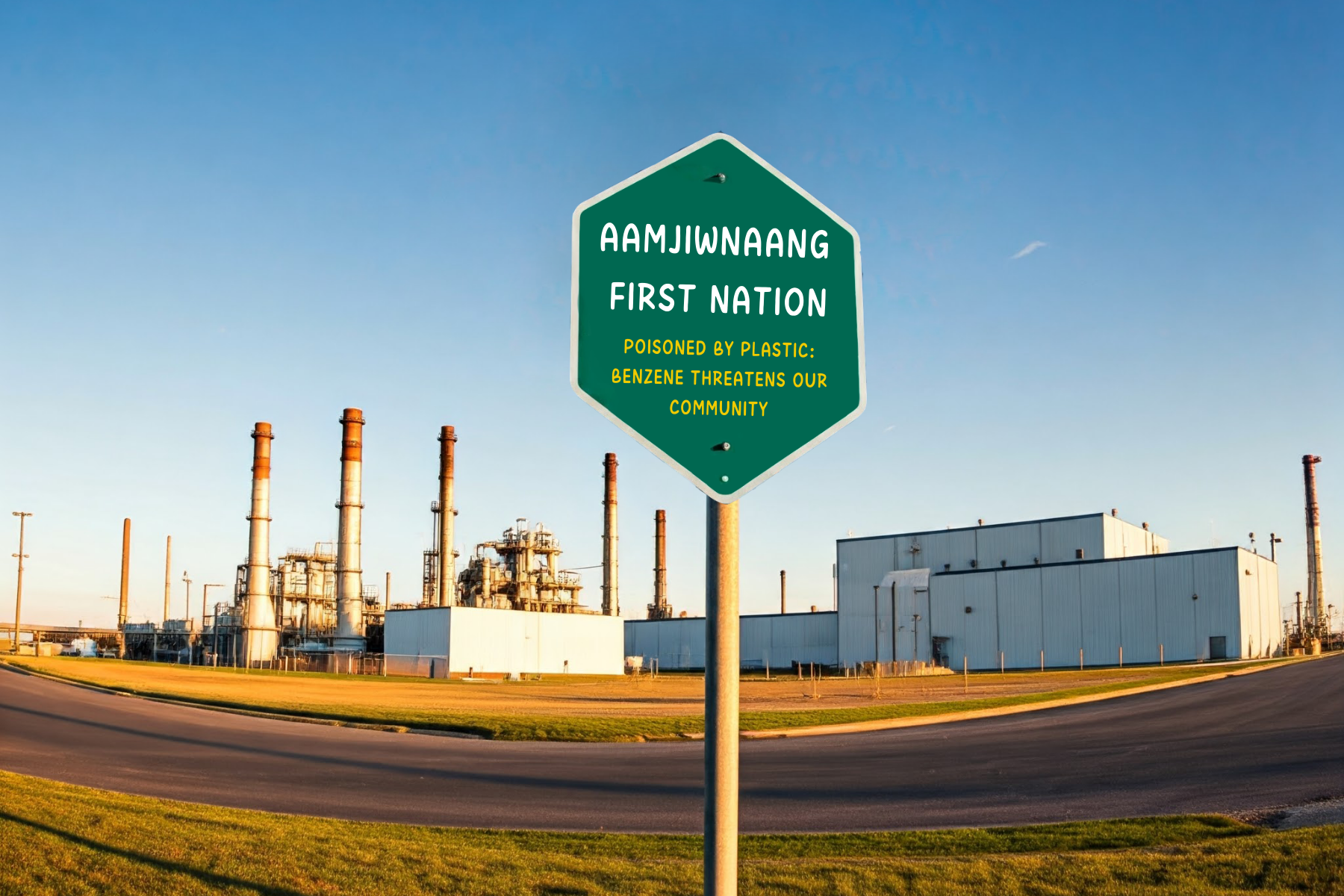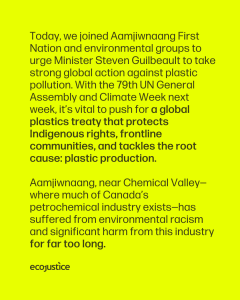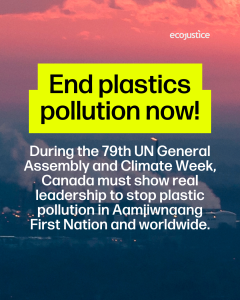
Global Plastics Treaty to Protect Indigenous Peoples’ Rights
Environmental groups urged Minister Guilbeault to secure a global plastics treaty to protect Indigenous rights and reduce plastic production impacts.
Friends of the Earth Canada signed on to the below letter initiated by Ecojustice.
September 20, 2024
Sent via e-mail
The Honourable Steven Guilbeault MP
Minister of Environment and Climate Change
200 Sacré-Coeur Boulevard
Gatineau QC K1A 0H3
Dear Minister Guilbeault:
Re: Upcoming United Nations General Assembly (UNGA) Meetings and the Global Plastics Treaty Negotiations (INC-5)
We appreciate your recent efforts to address the chronic air quality issues and rights-violations caused by benzene emissions from plastic facilities on Aamjiwnaang First Nation’s territory by issuing an Interim Order in May of this year requiring vapour control measures.[1]
We also welcome the statements and declarations you have made indicating your commitment to reducing the production and consumption of primary plastic polymers, including as a member of the G7[2] and the High Ambition Coalition to End Plastic Pollution[3], as well as the support Canada has signaled for progressive approaches on chemicals and products of concern.
However, more than declarations and measures taken on a case-by-case emergency basis are required. As such, we are writing to urge Canada to demonstrate leadership and act on commitments to secure an internationally binding plastics treaty that includes measures that will meaningfully reduce plastic production levels in the upcoming high-level UNGA meetings and the final round of global plastic treaty negotiations at INC-5.
In addition to control measures on products and chemicals of concern, the global plastics treaty must include supply side measures that reduce the production of virgin plastics, prioritizing a global plastic production reduction target and associated mandatory national reductions. Such measures are required because of the harmful impacts and pollution caused by plastic production, both at the source of production but also cascading down throughout the entire life-cycle of plastics.
Aamjiwnaang First Nation provides a clear example of the impacts of plastic production and the need for urgent and effective action to address it. As you know, the Nation has been experiencing the impacts of pollution from plastic production firsthand for many years. The Nation remains under the “State of Emergency” that was declared in April 2024, due to dangerous levels of benzene, a cancer-causing chemical used and released by the nearby INEOS Styrolution plant during the production of the plastic monomer styrene[4].
As such, we need a global plastics treaty that protects the health and well-being of Aamjiwnaang First Nation and all other Indigenous Peoples around the world as original Peoples with Inherent Rights, including the Rights articulated in the United Nations Declaration on the Rights of Indigenous Peoples, which requires meaningful inclusion of Indigenous Peoples and their knowledge systems in the development and implementation of the global plastics treaty as Rights-holders. We also need a global plastics treaty that protects the health and well-being of all people – including frontline and fenceline communities and workers – and ensures their Human Rights and their Right to a Healthy Environment are not violated. Such protections can only be effectively achieved by addressing the source of the problem: plastic production.
In sum, we need proactive and consistent measures that reduce plastic production levels across the globe enshrined in a legally binding international treaty. These measures should be developed and implemented collaboratively, particularly with Indigenous Peoples as Rights-holders, and be informed by Indigenous science and knowledge systems.
The coming months will be critical for laying the groundwork for a successful outcome at INC-5. We ask that you build upon the good work you have done to-date to ensure that this key issue is meaningfully addressed in the upcoming high-level meetings and final round of global plastics treaty negotiations. The rights of current and future generations depend on the leadership you display in the weeks and months to come.
Sincerely,
Signatories:
Ecojustice Canada
Aamjiwnaang First Nation
Environmental Defence Canada
Canadian Association of Physicians for the Environment
Friends of the Earth Canada
CAN-Rac
Greenpeace Canada
Mind Your Plastics
Surfrider Canada
David Suzuki Foundation
Health and Environmental Justice Support
Action on Smoking and Health
West Coast Environmental Law
[1] Minister Guilbeault imposes strict benzene pollution controls in the pursuit of environmental justice for Aamjiwnaang First Nation and Sarnia, Ontario – Canada.ca
[2] https://www.g7italy.it/wp-content/uploads/G7-Climate-Energy-Environment-Ministerial-Communique_Final.pdf.
[3] HAC Member States Ministerial Joint Statement for INC-4 | High Ambition Coalition to End Plastic Pollution : High Ambition Coalition to End Plastic Pollution (hactoendplasticpollution.org).
[4] Aamjiwnaang First Nation declares state of emergency over benzene levels | CBC News.
Images By Ecojustice:
Relevant Topics:
Global Plastic Treaty Negotiations: Action on Conflict of Interest
Concerns over UAE’s role in the HAC for a Global Plastics Treaty





